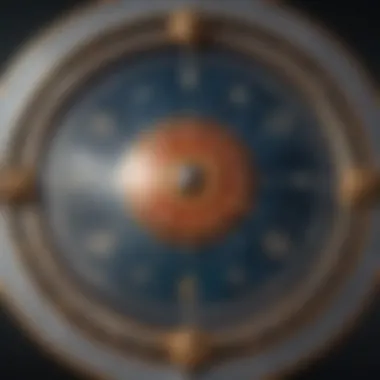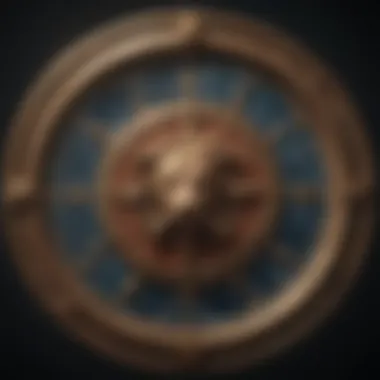Navigating the Intricacies of Horoscope Chart Reading


Intro
Reading a horoscope chart can be an intricate endeavor filled with layers of nuance. Each individual's chart is a unique compass, guiding their life based on positions of celestial bodies at their time of birth. This exploration into zodiac profiles, compatibility insights, and astrological events is designed to equip both novices and seasoned enthusiasts with the tools needed for a comprehensive understanding of horoscope reading.
Zodiac Profiles
Overview of Each Sign
The zodiac comprises twelve distinct signs, each associated with specific dates, symbols, and elemental qualities. Understanding these profiles is essential for anyone seeking to read horoscope charts effectively.
- Aries: Bold and adventurous, exploring new opportunities.
- Taurus: Grounded and patient, valuing stability and comfort.
- Gemini: Quick-witted and versatile, thriving on communication.
- Cancer: Nurturing and sensitive, prioritizing family and home.
- Leo: Charismatic and proud, often taking center stage.
- Virgo: Detail-oriented and practical, focusing on efficiency.
- Libra: Diplomatic and fair-minded, seeking harmony in relationships.
- Scorpio: Intense and transformative, embracing deep connections.
- Sagittarius: Free-spirited and optimistic, valuing adventure and discovery.
- Capricorn: Ambitious and disciplined, driven by long-term goals.
- Aquarius: Innovative and rebellious, championing individuality.
- Pisces: Intuitive and dreamy, often connected to the spiritual realm.
Personality Traits
Each sign exhibits unique personality traits shaped by their elemental association and mode. Grouping signs into fire, earth, air, and water reveals deeper character insights:
- Fire Signs (Aries, Leo, Sagittarius): They embody enthusiasm, creativity, and passion.
- Earth Signs (Taurus, Virgo, Capricorn): They reflect practicality, stability, and material concern.
- Air Signs (Gemini, Libra, Aquarius): They convey intellect, communication, and social engagement.
- Water Signs (Cancer, Scorpio, Pisces): They personify emotions, intuition, and depth of feeling.
Strengths and Weaknesses
Understanding strengths and weaknesses is vital for holistic chart interpretation. Here’s a brief overview:
- Aries: Strength – courage; Weakness – impulsive.
- Taurus: Strength – reliability; Weakness – stubbornness.
- Gemini: Strength – adaptability; Weakness – indecisiveness.
- Cancer: Strength – empathy; Weakness – moodiness.
- Leo: Strength – leadership; Weakness – arrogance.
- Virgo: Strength – analytical; Weakness – critical.
- Libra: Strength – cooperation; Weakness – avoidance of conflict.
- Scorpio: Strength – passion; Weakness – jealousy.
- Sagittarius: Strength – optimism; Weakness – tactlessness.
- Capricorn: Strength – determination; Weakness – pessimism.
- Aquarius: Strength – originality; Weakness – aloofness.
- Pisces: Strength – creativity; Weakness – escapism.
Compatibility Insights
Love and Relationships
The dynamics of relationships can often be illuminated through astrological compatibility. Couples can benefit from analyzing their sun, moon, and rising signs to paint a fuller picture:
- Some combinations, such as Leo and Aries, often show great synergy and shared passion.
- Contrasts may arise with signs like Virgo and Sagittarius, where practical versus spontaneous approaches can create tension.
Friendship Compatibility
Friendships thrive on shared values and compatible energies. Zodiac signs grouped by element often foster strong connections:
- Earth signs find comfort in practicality and shared stability.
- Fire signs unite over passion and enthusiasm, creating lively social dynamics.
Workplace Dynamics
Understanding astrological traits can enhance professional relationships. Communication styles and Problem-solving approaches can vary:
- A Capricorn's methodical approach may pair well with a Gemini's innovative thinking, fostering a productive team environment.
Astrological Events
Monthly/Weekly Horoscope Breakdown
Tracking regular astrological updates provides context for changes in personal energies. Astrologers often recommend incorporating a routine to check these forecasts:
- Monthly horoscopes provide insight into broader themes.
- Weekly horoscopes dive into immediate influences affecting daily choices.
Notable Celestial Events
Celestial events such as full moons, eclipses, and retrogrades play significant roles in influencing life events. Awareness of these occurrences helps individuals navigate their impact:
- Lunar eclipses are known for bringing closure, highlighting the need for release.
- Mercury retrograde may necessitate careful communication and organizational skills.
How to Prepare for Astrological Shifts
Prepare for significant astrological events by grounding your routine and focusing on self-reflection. Consider journaling your feelings or setting intentions during full moons. This practice can enhance self-awareness and emotional clarity, equipping you to navigate shifts with confidence.
By understanding the complexities of your horoscope, you gain valuable insights into your life and relationships. This understanding can inform choices and actions that align with your true nature.


Prolusion to Horoscope Charts
Reading a horoscope chart is a journey into the self and the cosmos. Understanding this topic requires an awareness of the complex elements that form the basis of astrological interpretation. It is essential to note that horoscope charts are not merely a collection of symbols; they represent opportunities for personal insight and growth.
Astrology enthusiasts often begin this exploration by defining key components that play a significant role in the analysis of a chart. The significance of zodiac signs, planets, houses, and aspects cannot be understated when attempting to decode the personal message contained within these charts.
Defining Horoscope Charts
Horoscope charts are visual representations of the positions of planets, stars, and other celestial bodies at a specific moment in time, usually at the birth of an individual. Each chart, often referred to as a natal chart, is unique and reflects the unique energies and influences that the cosmos held at the time of birth.
A standard horoscope chart is typically circular and is divided into twelve sections, known as houses. Each house corresponds to different aspects of life, such as relationships, career, and personal growth. The zodiac signs that the planets occupy at the time of birth also play a crucial role in this interpretation. Essentially, a horoscope chart serves as a map to the individual's potential, challenges, and inherent traits.
The Historical Context of Astrology
Astrology has a rich history that dates back thousands of years, interwoven with various cultures and civilizations. The roots of astrology can be traced back to ancient Mesopotamia, where celestial movements were documented and interpreted. The Babylonians developed one of the earliest systems of astrology that influenced later practices.
The ancient Greeks significantly advanced astrological concepts, introducing ideas such as zodiac signs and the importance of planetary cycles. Figures like Ptolemy further formalized these concepts in the second century AD, laying the groundwork for modern astrology.
As astrology evolved, it adapted to various cultural contexts, influencing and being influenced by advancements in science and philosophy. The historical context enriches the understanding of horoscope charts today, illustrating that astrology is not merely a static practice but rather a dynamic field that continues to evolve in response to societal changes.
Astrology, in its essence, is a mirror reflecting the relationships between various cosmic bodies and the human experience—an intricate dance between fate and free will.
The study of horoscope charts is, thus, an exploration of both personal identity and collective history, making it a profound avenue for understanding ourselves and our environment.
Elements of a Horoscope Chart
Astrology is a multifaceted discipline, and the elements of a horoscope chart create its foundation. Understanding these components is essential for accurate interpretation and meaningful insights. Each element represents a unique aspect of celestial influence on an individual’s life. Realizing the significance of these elements contributes to better decision-making and self-reflection.
Zodiac Signs: An Overview
Zodiac signs are at the core of any horoscope chart. There are twelve zodiac signs, each corresponding to a month in the astrological calendar. Each sign has specific traits and characteristics that influence a person's nature, preferences, and behavior.
- Aries: Bold and energetic
- Taurus: Reliable and practical
- Gemini: Versatile and communicative
- Cancer: Intuitive and emotional
- Leo: Confident and charismatic
- Virgo: Analytical and detail-oriented
- Libra: Diplomatic and harmonious
- Scorpio: Intense and passionate
- Sagittarius: Adventurous and optimistic
- Capricorn: Disciplined and ambitious
- Aquarius: Independent and innovative
- Pisces: Compassionate and artistic
Each sign brings its own unique energy, impacting one’s personality and interactions. A deeper understanding of these signs allows for greater self-awareness and personal growth.
Planets and Their Influences
Planets symbolize different aspects of life and are vital to horoscope readings. They represent various archetypes and influence human behavior through their energies. The main planets and their influences include:
- Sun: Represents the ego and self-expression
- Moon: Governs emotions and instincts
- Mercury: Connects to communication and intellect
- Venus: Influences love and beauty
- Mars: Related to action and assertiveness
- Jupiter: Connects with growth and expansion
- Saturn: Represents discipline and structure
- Uranus: Associated with innovation and change
- Neptune: Tied to dreams and intuition
- Pluto: Involves transformation and power
Understanding the role of each planet enhances comprehension of how they govern various aspects of life. Each planet's positioning at the time of one's birth can reveal unique patterns and influences.
Houses: Understanding Their Role
The concept of houses adds another layer to the interpretation of a horoscope chart. There are twelve houses, each representing different life areas, such as career, relationships, and personal growth. The significance of houses is as follows:
- First House: Self-image and identity
- Second House: Finances and possessions
- Third House: Communication and learning
- Fourth House: Home and family
- Fifth House: Creativity and romance
- Sixth House: Health and service
- Seventh House: Partnerships and commitments
- Eighth House: Transformation and shared resources
- Ninth House: Beliefs and travel
- Tenth House: Career and public image
- Eleventh House: Friendships and aspirations
- Twelfth House: Subconscious and solitude
Each house influences different aspects of life, and where planets fall in these houses can reveal personal challenges and opportunities. This understanding aids in the navigation of life events.
Aspects: The Relationships Between Celestial Bodies
Aspects describe the angles formed between planets in a chart. These angles indicate how planets communicate with one another and can signify harmony or tension. The primary types of aspects include:
- Conjunction: Strongest influence, when two planets are close together
- Opposition: Indicates tension and balance
- Square: Represents conflict and challenges
- Trine: A harmonious connection that allows ease of energy
- Sextile: Supportive connection that encourages cooperation
Analyzing aspects provides insight into how different energies within a chart interact. The interplay of these celestial bodies offers a deeper understanding of personal dynamics and challenges.
Understanding the elements of a horoscope chart is crucial. Each component contributes uniquely to your astrological portrait, illuminating different facets of life, personality, and potential.
The Process of Reading a Horoscope Chart


Reading a horoscope chart involves a systematic approach. It is about connecting various astrological elements into a cohesive narrative about an individual's life. Understanding this process allows enthusiasts to interpret charts meaningfully and gain insights into personal growth and relationships. It is essential to grasp specific elements, benefits, and considerations while going through this process.
Gathering Necessary Information
Before one can analyze a horoscope chart, gathering accurate information is crucial. This information includes the individual's date, time, and place of birth. Each element serves a specific function. The date provides the zodiac sign. The time determines the exact position of celestial bodies. The location helps pinpoint houses in the chart. Collecting this data ensures the chart is personalized and reflective of the individual's unique astrological influences.
- Date of Birth: Determines the zodiac sign.
- Time of Birth: Defines the ascendant or rising sign.
- Place of Birth: Assists in calculating the houses.
Having precise information contributes to producing a detailed and relevant horoscope chart, laying the foundation for further analysis.
Interpreting Zodiac Signs
Zodiac signs are the most recognizable aspect of astrology. Each sign carries distinct characteristics. They categorize individuals into archetypes, influencing personality traits and behavior. To interpret these signs, consider their elemental quality (fire, earth, air, water) and modality (cardinal, fixed, mutable).
- Fire Signs: Aries, Leo, Sagittarius - represent enthusiasm and passion.
- Earth Signs: Taurus, Virgo, Capricorn - symbolize practicality and stability.
- Air Signs: Gemini, Libra, Aquarius - denote intellect and social interaction.
- Water Signs: Cancer, Scorpio, Pisces - highlight emotions and intuitiveness.
Understanding the zodiac signs helps in analyzing how these traits manifest in an individual's life and interactions.
Analyzing the Houses
In astrology, houses serve as sectors of experience. Each of the twelve houses correlates with different life areas, such as relationships, career, or self-identity. When analyzing the houses in a horoscope, consider several aspects. The position of celestial bodies in these houses reflects their influence on specific life themes. For instance, if Venus is in the seventh house, it may suggest a strong focus on partnerships.
- 1st House: Self and personality.
- 4th House: Home and family.
- 7th House: Partnerships and marriage.
- 10th House: Career and public life.
This analysis offers layers of understanding about how environmental contexts shape personal experiences.
Decoding Planetary Aspects
Planetary aspects provide insight into the relationships between celestial bodies in a horoscope chart. These aspects can manifest as harmonious or challenging influences. Decoding these aspects involves examining angles formed by planets. Key aspects include conjunctions, trines, squares, and oppositions. Each aspect can signify different energetic dynamics.
- Conjunction: Strengths are amplified among planets in the same sign.
- Trine: Represents harmony and ease of energy.
- Square: Signifies challenges and tensions.
- Opposition: Highlights areas of conflict and balance.
Understanding aspects allows for a nuanced comprehension of how different influences interact within an individual's chart, offering valuable insights into personal challenges and advantages.
Overall, the process of reading a horoscope chart is essential. It requires attention to detail and an understanding of how various astrological elements interact. This creates a complex, yet enlightening portrait of personal and relational dynamics.
Practical Applications of Horoscope Analysis
Horoscope analysis offers various practical benefits that extend beyond mere predictions. Understanding how to read a horoscope chart can enrich personal insights, foster healthier relationships, and guide career choices. Each of these elements shows the relevance of astrology in daily life. By delving deeper into practical applications, individuals can find pathways for growth and understanding.
Personal Growth and Self-Awareness
Astrology serves as a powerful tool for personal growth. By examining one's horoscope chart, a person can uncover deep-seated motivations, desires, and fears. For example, analyzing the positions of planets can provide insights into one’s personality traits. Recognizing these traits can encourage a person to value their strengths and improve on weaknesses.
Here are some ways astrology fosters self-awareness:
- Identifying Strengths: Each zodiac sign is associated with specific strengths. Understanding these can help individuals leverage their abilities in various aspects of life.
- Acknowledging Weaknesses: Similarly, the chart reveals challenges. Acknowledging these issues can pave the way for personal development and healing.
- Tracking Growth Over Time: Astrology can guide reflections on past experiences. By studying major transits, one can understand how life events align with astrological patterns.
Personal growth through horoscopes is not just about identifying traits. It is a journey towards deeper self-understanding.
Understanding Relationship Dynamics
Astrology also plays a significant role in understanding relationship dynamics. The compatibility between two individuals can be evaluated by comparing their horoscopes. By analyzing elements such as sun signs, moon signs, and rising signs, people can gain insights into interpersonal connections.
This section highlights key aspects of relationship dynamics through astrology:
- Compatibility Analysis: Understanding how different signs interact helps individuals navigate romantic relationships more effectively.
- Conflict Resolution: Astrology provides tools for identifying potential areas of conflict and ways to mitigate them.
- Empathy and Understanding: Recognizing individual differences can lead to more compassionate communication. This is essential for nurturing healthy relationships.
Career Guidance through Astrology
In the realm of careers, astrology can provide valuable insights for professionals at any stage. A person's horoscope can reveal strengths suited for specific careers or industries. By understanding planetary placements, individuals can align their career choices with their personal inclinations.
Considerations for using astrology for career guidance include:


- Strengths and Weaknesses: Knowing personal traits can steer a person toward fulfilling job roles, whether they suit a leadership position or a more supportive function.
- Ideal Work Environments: Different signs thrive in varied work settings. For instance, some may excel in collaborative settings, while others prefer solo projects.
- Timing for Career Moves: Astrology can aid in determining optimal times for job changes or launching new projects. Transits that support new beginnings can provide a green light for such activities.
In summary, astrology is not merely about predictions. The practical applications of horoscope analysis encourage personal growth, enhance relationships, and guide career choices, providing a comprehensive framework for navigating life’s complexities.
Challenges and Misconceptions in Horoscope Reading
Understanding the challenges and misconceptions in horoscope reading is crucial for anyone looking to delve into astrology. Many approach their charts with a mix of curiosity and skepticism. This section aims to clarify some of the common issues that arise when reading horoscopes and highlight the implications these challenges can have on personal interpretations of astrological data.
Common Misunderstandings
One of the largest hurdles in fully grasping horoscope charts is the multitude of misunderstandings that surround astrology. Many people mistakenly believe astrology determines fate in a rigid manner. In reality, it serves as a guide rather than a destiny. Here are some common misconceptions:
- Astrology is a Science: Astrology is often thought to be a scientific discipline. However, it is regarded as a pseudoscience by many experts. While it uses mathematics and astronomy for chart preparation, its interpretations rely more on symbolic meaning than empirical evidence.
- Sun Sign Equals Personality: A significant misunderstanding is ascribing one's entire personality to their sun sign alone. Although the sun sign plays a role, it is just one of many components that shape an individual. Moon signs, rising signs, and the specific positions of planets add considerable depth to a person’s astrological profile.
- Horoscopes Are One-Size-Fits-All: Many individuals rely heavily on generalized horoscopes found in newspapers or online. These broad interpretations fail to account for individual variations in charts. Each person's planetary arrangement is unique and demands a tailored reading.
To navigate these misunderstandings, it is important for enthusiasts to familiarize themselves with the fundamental aspects of astrology. Doing so allows them to harness their charts more effectively and consciously.
Navigating Conflicting Advice
In the expansive world of astrology, conflicting advice can be perplexing. When seeking insights, one person may interpret planetary aspects radically differently from another. This disparity can stem from various factors:
- Different Schools of Thought: Astrology boasts numerous traditions, such as Western, Vedic, and Chinese astrology. Each offers its unique perspective and techniques, leading to conflicting interpretations.
- The Complexity of Individual Charts: The nuances of individual charts can result in varying advice. Factors such as the positions of planets in houses, their aspects to each other, and personal experiences can dramatically influence readings and guidance.
When presented with conflicting advice, it may be beneficial to focus on:
- Identifying Core Teachings: Look for what resonates most personally. Are there consistent themes or insights that appear across different interpretations? Concentrate on advice that aligns with your inner understanding of self.
- Consulting Multiple Sources: Diversifying resources can help build a more comprehensive understanding of astrology. Books by established authors, reputable online tools, or even communities on platforms like Reddit may provide varied insights that enrich the learning experience.
In essence, while challenges and misconceptions abound, recognizing them can deepen one's journey into astrology. A clearer understanding invites a more enriching experience and encourages a thoughtful approach to personal growth and self-awareness.
Tools and Resources for Astrology Enthusiasts
Understanding astrology is an intricate journey, and having the right tools and resources is crucial for anyone looking to deepen their knowledge. A wide array of literature and digital aids are available to assist both novices and experienced practitioners to navigate the complexities of horoscope charts. Utilizing these resources enhances one’s understanding of astrological principles and assists in the practical application of these concepts in real-world scenarios.
Books for Further Learning
Books serve as the foundation for astrological study. They offer in-depth insights into both the theoretical and practical aspects of astrology. Several well-regarded titles deserve mention:
- "Astrology for the Soul" by Jan Spiller focuses on the nodes of the moon and their impacts on personal growth.
- "The Only Astrology Book You'll Ever Need" by Joanna Martine Woolfolk provides comprehensive guidelines for understanding all key concepts in astrology.
- "Parker's Astrology: The Definitive Guide" by Julia and Derek Parker offers a thorough examination of chart interpretation, making it a valuable resource.
These books not only break down complex concepts but also provide case studies which aid in practical understanding. Additionally, they often include exercises that encourage self-reflection and personal application, allowing readers to connect the knowledge gained with their individual experiences.
Online Tools and Applications
In the digital age, many online resources complement traditional learning methods. Various websites and applications can help enthusiasts analyze and interpret their horoscope charts efficiently. Some prominent options include:
- Astro.com - Offers free natal charts and interpretive tools.
- AstroSeek - Includes diverse calculators for synastry, transits, and more.
- Co–Star - Provides personalized, real-time horoscopes through a user-friendly app interface.
These tools allow users to access astrological information instantaneously. Users can experiment with their birth data and obtain interpretations that would typically require extensive study. However, while these tools are valuable, it is important to maintain a critical approach, ensuring that one does not rely exclusively on them but instead uses them to supplement their learning.
A well-rounded education in astrology combines traditional texts and modern tools, enabling enthusiasts to explore the depths of horoscope charts and their implications effectively.
Future Trends in Astrology
The realm of astrology is currently experiencing notable transformations. These shifts not only reflect changing societal attitudes but also indicate how astrological practices are adapting to modern demands. The future of astrology is vital for both seasoned practitioners and newcomers, as it provides insights on how these shifts could influence their approaches to horoscope reading and interpretation.
The Role of Technology in Astrology
Technological advancements have revolutionized many fields, and astrology is no exception. The rise of numerous apps and websites has made astrological information more accessible than ever. Such platforms allow users to generate their horoscope charts at a mere click. Moreover, data analytics is integrating into astrology, enabling practitioners to fulfill personalized readings grounded in precise data.
- Astrology Apps: Applications like Co-Star and Astromatrix not only provide daily horoscopes but also help users understand zodiac placements in-depth.
- Data Interpretation: Enhanced algorithms now offer improved interpretations, thus making astrology more relatable to individual experiences.
From automated reports to curated insights, technology enhances the personalization of readings. This means that users are not just passive consumers of their horoscopes but can engage with astrology actively. In this way, technology strips away some of the esoteric barriers that previously pigeonholed individuals away from embracing astrology more broadly.
Shifts in Public Perception of Astrology
In recent decades, there has been a significant increase in the acceptance of astrology as a tool for self-awareness and growth. Many individuals who once dismissed astrology are now exploring its relevance in their lives. This shift in public perception goes beyond mere curiosity; it embodies a general movement toward holistic well-being.
- Mainstream Acceptance: People are increasingly using astrology for understanding themselves and their relationships. This trend led to the inclusion of astrological content in mainstream media, such as social media platforms like Facebook and Instagram.
- Societal Influence: The current cultural climate favors discussing mental health and emotional well-being. Astrology serves as a framework for people to explore their emotions and navigate life decisions.
As astrology becomes intertwined with spiritual and psychological practices, it may reach even wider audiences. Overall, these shifts indicate a growing recognition of astrology not just as a pastime but as a valuable resource in contemporary life.
“Astrology is not just the study of stars; it is the study of ourselves through the lens of the cosmos.”



